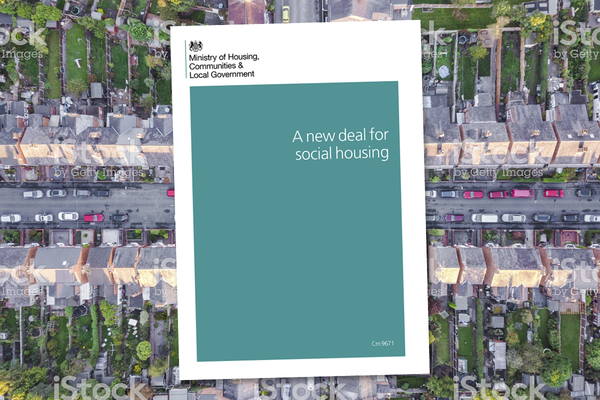You are viewing 1 of your 1 free articles

The chair of the regulator is wrong to suggest we want to avoid public scrutiny
Simon Dow is wrong to suggest we don’t want more regulation, but league tables are not an intelligent way of assessing housing associations’ performance, argue Professor Ian Cole and Tony Stacey
One of us (Ian) is a Manchester United supporter, so at the moment the Premier League Table does not make for comfortable reading.
But the table does not lie. Liverpool are top because they have maximum points and the best goal difference. If only it were as simple as this in the muddier fields that housing associations play on.
But it isn’t and we think it’s very dangerous to suggest that it could or should be like that.
We are therefore very critical of the Social Housing Green Paper’s proposal to introduce housing association league tables as a metric for scoring their performance on customer service and for future investment.
This has prompted Simon Dow, chair of the regulation committee, to accuse us, and other critics, of wishing to avoid public scrutiny.
Nothing could be further from the truth. South Yorkshire Housing Association (SYHA) was the subject of an in-depth assessment earlier this year – while we feel the approach was rather narrow, we were subject to robust challenge and close scrutiny and felt that the eventual judgement was fair and well-founded.
“League tables are a quick fix, and they offer a form of universalised appraisal that takes the place of arriving at robust and nuanced judgements.”
But that was the product of wide-ranging discussion and having an opportunity to make clear the distinctive nature of our association, so we would be judged on an appropriate basis rather than subjected to an ill-fitting generic template.
Our problem with the current system is not that there is too much regulation and scrutiny of the sector.
We are in fact in favour of much more regulation, but of an appropriate focus, process and outcome.
We just do not think that league table metrics are an intelligent way of assessing how housing associations are doing.
They are a quick fix, and they offer a form of universalised appraisal that takes the place of arriving at robust and nuanced judgements through dialogue and customised investigation.
And above all, despite the rhetoric, they leave out the voice of the real experts about housing associations’ performance – our customers.
SYHA, in common with most Placeshapers members, put customers at the heart of our services. We don’t stop at having tenants on the board or supporting our robust scrutiny panels, we design and evaluate services together. Last year, for example, our customers carried out 55 quality insight inspections of our services.
A quarter of the agenda for our last board meeting was handed over to a range of tenants to feed their views to the board – on safeguarding, diversity, support services and hard-to-let homes. League tables would not touch the edges with this stuff.
But the sins of commission for any putative league table are likely to be compounded by the sins of omission. The Sector Scorecard is a good example. While it has some merit, they miss key aspects of what, in our view, housing associations are about.
As the Homes for Cathy group has consistently argued, the scorecard needs to include measures relating to homelessness (rate of evictions, percentage of homeless people housed etc), and where are the measures that touch on social purpose?
Yes, this government wants associations to build more homes but they also want us to tackle rough sleeping, support the social care system and invest in employment projects.
So while we can readily accept that Liverpool are the best team in the league at the moment, we would be far more sceptical that the housing association table-toppers would be delivering the best service for their customers.
They will simply have played the system most effectively.
And if you want further evidence about how the introduction of league tables can draw organisations away from their core mission, skew their priorities and generate more heat than light in competing with each other... well, you could always ask university vice chancellors for their views.
Bring on effective scrutiny and genuine customer involvement. But don’t relieve yourself of this responsibility by concocting league tables based on false premises.
Professor Ian Cole, chair, and Tony Stacey, chief executive, South Yorkshire Housing Association
Regulatory judgements in England explained
The Regulator of Social Housing publishes regulatory judgements for all providers owning 1,000 or more social housing homes.
These judgements set out whether the provider is complying with the regulator’s governance and financial viability standards.
The regulator carries out an assessment either through a scheduled in-depth assessment, or reactive engagement (in which the regulator acts following information about a provider).
It then awards the provider a rating from one to four for financial viability (V) and a separate rating from one to four for governance (G).
Providers must score two or higher in both categories to be judged as complying with the standards.
As providers have increasingly taken on more risk to cross-subsidise social and affordable housing delivery through market-facing activity, the regulator has changed a number of associations’ viability ratings from V1 to V2.
The regulator often categorises this kind of regulatory action as ‘regrades’ rather than downgrades. Click here to read more.
Key to ratings:
V1/G1: Compliant
V2/G2: Compliant
V3/G3: Non-compliant and intensive regulatory engagement needed
V4/G4: Non-complaint, serious failures, leading to either intensive regulatory engagement or the use of enforcement powers
Rating straplines in full:
Governance ratings:
G1: The provider meets our governance requirements.
G2: The provider meets our governance requirements but needs to improve some aspects of its governance arrangements to support continued compliance.
G3: The provider does not meet our governance requirements. There are issues of serious regulatory concern and in agreement with us the provider is working to improve its position.
G4: The provider does not meet our governance requirements. There are issues of serious regulatory concern and the provider is subject to regulatory intervention or enforcement action.
Financial viability ratings:
V1: The provider meets our viability requirements and has the financial capacity to deal with a wide range of adverse scenarios.
V2: The provider meets our viability requirements. It has the financial capacity to deal with a reasonable range of adverse scenarios but needs to manage material risks to ensure continued compliance.
V3: The provider does not meet our viability requirements. There are issues of serious regulatory concern and, in agreement with us, the provider is working to improve its position.
V4: The provider does not meet our viability requirements. There are issues of serious regulatory concern and the provider is subject to regulatory intervention or enforcement action.
Jargon-busting: some regulatory terms and what they mean
- Co-regulation: this means boards are responsible for deciding how to meet the regulator’s standards – the regulator does not prescribe how to do this
- Gradings under review list: a public list of providers under investigation who are at risk of being judged non-compliant with regulatory standards
- In-depth assessment: a planned inspection, in which the regulator assesses a providers viability, governance and approach to value for money
- Narrative regulatory judgement: a detailed explanation of the reasons behind a regulatory judgement. Narrative judgements are published where a providers’ viability or governance ratings have changed, or where RSH has particular issues or concerns.
- Reactive engagement: refers to the regulator reacting to complaints or allegations about a provider and taking action
- Stability check: an annual assessment of all providers owning 1,000 social homes or more. RSH uses accounts and statistical return data to check for any changes in a providers’ risk profile.
- Strapline regulatory judgement: where a provider is meeting the standards, and its governance or viability ratings have not changed since its previous judgement, the regulator does not publish a full judgement explaining its reasons for the gradings. Instead it just publishes the gradings themselves, in a ‘strapline’.
Social Housing Green Paper: full coverage
All our Social Housing Green Paper coverage in one place:
Green paper measures are not enough to create May’s ‘new generation’ of council homes Green paper proposals are welcome but much more is needed to support councils to build, writes John Bibby
Green paper shows ministers now see associations as trusted partners Focusing on the failure of the green paper to address supply misses the point, writes Boris Worrall
Government should focus on building on what is already strong Philippa Jones considers the Social Housing Green Paper through a slightly different lens
We need more than a week of delayed announcements bundled together Jules Birch reflects on the government’s ‘Housing Week’ announcements
The regulator should monitor how associations assist homeless people Government announcements this week are positive, but any enhanced role for the English regulator should include looking at homelessness prevention work, argues David Bogle
The regulator’s role should be limited to dealing with systemic failures Julian Ashby suggests the Housing Ombudsman Service should deal with all complaints
The green paper shows ministers are in listening mode Despite some glaring omissions, the government appears to be in listening mode and it is important the sector takes advantage, argues Emma Maier
A short history of social housing league tables Attempts to create league tables for housing associations are nothing new. Mervyn Jones looks at how they have worked in the past
League tables could prove blunt and counter-productive, sector warns Housing figures criticise government proposals to measure social landlords against performance indicators
Government ‘must decide how proactive regulator should be’ on consumer standards Ministers now face a dilemma over the regulator’s focus, sector figures say
The Green Paper: a golden opportunity missed? Melanie Rees assesses the Social Housing Green Paper against recommendations drawn up by the Chartered Institute of Housing and finds the government comes up short
Longer strategic partnerships and guranteed debt to boost social housebuilding The Social Housing Green Paper outlines key ways of boosting supply
The green paper is remarkable progress but it is still not enough The green paper suggests the government appears to be re-writing much of its policy since 2010, but more needs to be done, writes Jules Birch
Green paper marks a ‘milestone’ on resident involvement The government’s recognition residents need clear information is to be welcomed, now it up to the sector to embrace tenant involvement, writes Paul Hackett
Ministers consider stock transfer programme to community-led associations The stock transfer programme could be revived under proposals in the housing green paper
Access to housing grant could be tied to new league tables Grant could be awarded according to how well landlords meet performance indicators, the paper suggests
Ofsted-style regulation of tenant services proposed The government is considering expanding the Regulator for Social Housing’s remit to intervene over tenant services and give it a more “proactive approach to enforcement”
Government proposes dropping one-for-one Right to Buy replacement commitment A consultation paper published alongside the green paper proposes a broader measurement to replace the one-for-one pledge
A list of recent housing policy U-turns The green paper confirms yet more housing policy U-turns from the government, which has spent the past two years dropping policy ideas developed under the David Cameron government. Here is a rundown of the major changes in policy direction
Sector welcomes green paper but calls for more ‘ambitious investment’ Reaction to the proposals, from the National Housing Federation, Chartered Institute of Housing and more
Morning Briefing: reaction to green paper announcements how the media reported the proposals trailed by the government overnight
Government drops plans to force councils to sell higher-value stock The government drops plans to force councils to sell higher value homes
League tables and ‘sharper teeth’ for regulator in social housing green paper Ministers reveal some of the things in the paper ahead of its publication
Grenfell survivors: green paper does not go far enough survivors of the Grenfell Tower fire have said the measures published in the Social Housing Green Paper do not do enough to rectify issues in the social housing sector













